Daily Vocabulary Words: List of Daily Used Words
Hi there. Welcome to this special section @ Wordpandit.
Our endeavour here is straightforward: highlighting important daily vocabulary words, you would encounter in The Hindu. This is your repository of commonly used words; essentially, we are posting a list of daily used words. Hence, this has significant practical application as it teaches you words that are commonly used in a leading publication such as The Hindu.
Visit the website daily to learn words from The Hindu.
WORD-1: Aberrations
CONTEXT: As such episodes are becoming more common, it is time to think about the behaviour of Governors in Opposition-ruled States and to understand the legal consequences of such aberrations.
SOURCE: The Hindu
EXPLANATORY PARAGRAPH: Imagine you have a toy car that usually moves forward when you push it, but sometimes it suddenly starts moving sideways or backwards. That unexpected movement is called an “aberration.” It’s like when something doesn’t follow the usual pattern or behaves differently than expected.
MEANING: Unexpected or unusual deviations from what is normal or typical (noun). It can also mean the act of deviating from what is typical or expected (verb).
PRONUNCIATION: uh-buh-RAY-shun
SYNONYMS: Deviation, anomaly, irregularity, departure, divergence, variation, quirk
USAGE EXAMPLES:
1. The scientist noticed aberrations in the data that were difficult to explain.
2. The strange weather patterns were aberrations for that time of year.
3. The student’s behavior aberrated from the class norms, causing concern for the teacher.
4. The compass needle showed aberrant behavior near the magnetic field.
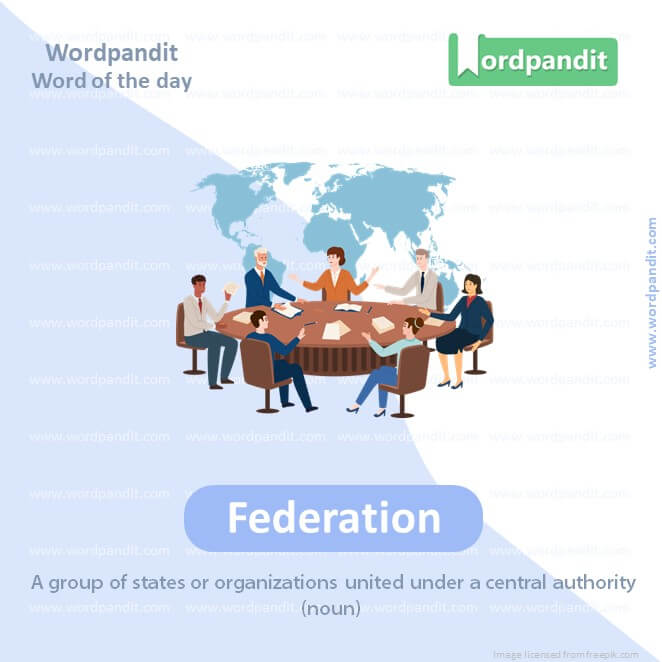
WORD-2: Federation
CONTEXT: He termed the activists of the Students’ Federation of India “criminals” and accused the Chief Minister of “sponsoring” them.
SOURCE: The Hindu
EXPLANATORY PARAGRAPH: Imagine you have a group of friends who all love playing soccer, and they decide to form a team together. When they join forces and work as one big team, it’s called a “federation.” It’s like a special club where everyone helps each other and works together towards common goals.
MEANING: A group of states or organizations united under a central authority
(noun).
PRONUNCIATION: fed-uh-RAY-shun
SYNONYMS: Alliance, union, coalition, confederation, league, consortium, partnership
USAGE EXAMPLES:
1. The countries formed a federation to promote trade and cooperation.
2. The Federation of Music Clubs organized a concert for local musicians.
3. The student unions formed a federation to address common issues on campus.
4. The International Space Federation collaborates on space exploration projects.
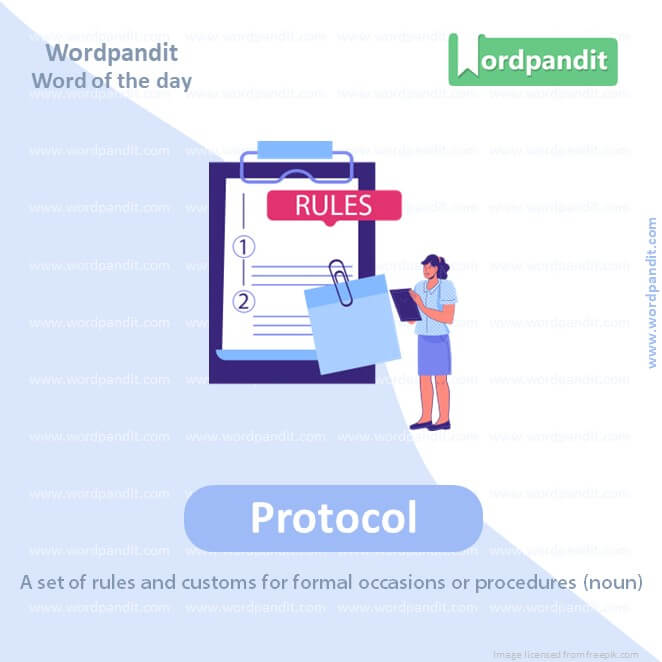
WORD-3: Protocol
CONTEXT: After his visit, in a clear breach of protocol, he toured Kozhikode without any previous announcement.
SOURCE: The Hindu
EXPLANATORY PARAGRAPH: Imagine you’re playing a game with your friends, and before you start, you agree on a set of rules to follow. These rules, like taking turns and not cheating, are called “protocol.” It’s like a special list of things everyone needs to do to make sure the game is fair and fun for everyone.
MEANING: A set of rules and customs for formal occasions or procedures (noun).
PRONUNCIATION: PROH-tuh-kawl
SYNONYMS: Procedure, etiquette, code, custom, convention, ritual, formalities
USAGE EXAMPLES:
1. The diplomatic protocol requires certain formalities to be observed during state visits.
2. Before the experiment, the scientists established a protocol for data collection.
3. Following the company’s protocol, employees must sign in and out when entering the building.
4. The protocol for addressing royalty differs from ordinary social interactions.
WORD-4: Emphasised
CONTEXT: In NCT of Delhi v. Union of India (2018), a Constitution Bench of the Supreme Court emphasised the need to identify the “moral values of the Constitution” based on a notion of “constitutional culture”.
SOURCE: The Hindu
EXPLANATORY PARAGRAPH: Imagine you’re telling a story to your friends about your pet dog, and you want to make sure they understand how much you love him. When you say things like “I really, really love my dog,” you are “emphasizing” your feelings. It’s like making certain words extra strong or important to show how much you mean them.
MEANING: To give special importance or attention to something, often by stressing or highlighting it (verb).
PRONUNCIATION: EM-fuh-sahyzd
SYNONYMS: Highlight, underline, stress, accentuate, underscore, spotlight, accent
USAGE EXAMPLES:
1. The speaker emphasized the need for environmental conservation in her speech.
2. She emphasized the importance of practicing regularly to improve in sports.
3. The teacher emphasized the key points of the lesson to help students remember them.
4. His tone emphasized the seriousness of the situation they were facing.
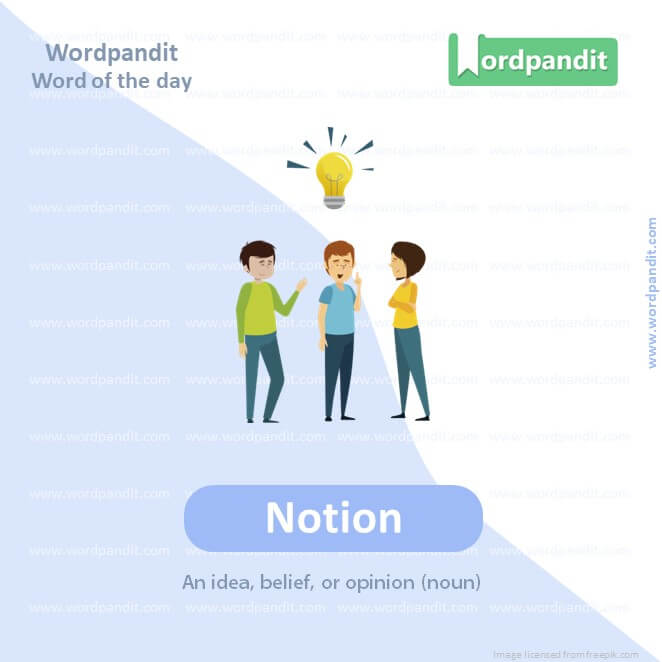
WORD-5: Notion
CONTEXT: In NCT of Delhi v. Union of India (2018), a Constitution Bench of the Supreme Court emphasised the need to identify the “moral values of the Constitution” based on a notion of “constitutional culture”.
SOURCE: The Hindu
EXPLANATORY PARAGRAPH: Imagine you have a tiny seed of an idea in your mind, like wanting to build a castle out of building blocks. That little seed is called a “notion.” It’s like a tiny thought or idea that might grow into something bigger if you give it time and attention.
MEANING: An idea, belief, or opinion (noun).
PRONUNCIATION: NOH-shun
SYNONYMS: Idea, concept, belief, thought, opinion, impression, conception
USAGE EXAMPLES:
1. He had a notion that it might rain later in the day.
2. She dismissed the notion of going out without a jacket in the cold weather.
3. The notion of fairness is important in any decision-making process.
4. The novel explores the notion of identity and self-discovery.
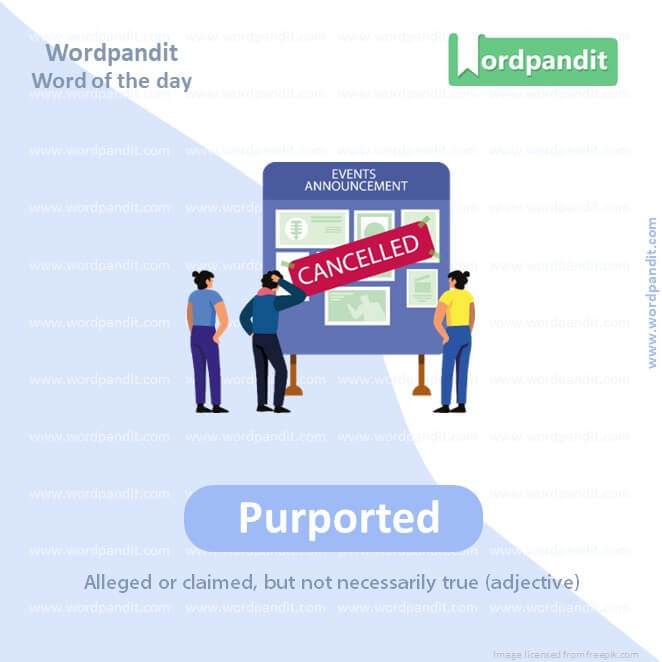
WORD-6: Purported
CONTEXT: It says that Governors shall not be answerable to any court for the exercise and performance of the powers and duties of their office or for any act done or purported to be done by them in their official capacity.
SOURCE: The Hindu
EXPLANATORY PARAGRAPH: Imagine someone tells you a story about seeing a dinosaur in their backyard last night. When you’re not sure if you believe them because it sounds too unbelievable, you might say their story is “purported.” It’s like saying something is claimed to be true, but you’re not sure if it really is.
MEANING: Alleged or claimed, but not necessarily true (adjective).
PRONUNCIATION: pur-PORT-ed
SYNONYMS: Alleged, supposed, claimed, professed, ostensible, purported, rumored
USAGE EXAMPLES:
1. The document contained purported evidence of the company’s wrongdoing.
2. The purported benefits of the new diet plan seemed too good to be true.
3. He presented a purported eyewitness account of the accident.
4. The purported cure for baldness turned out to be a scam.
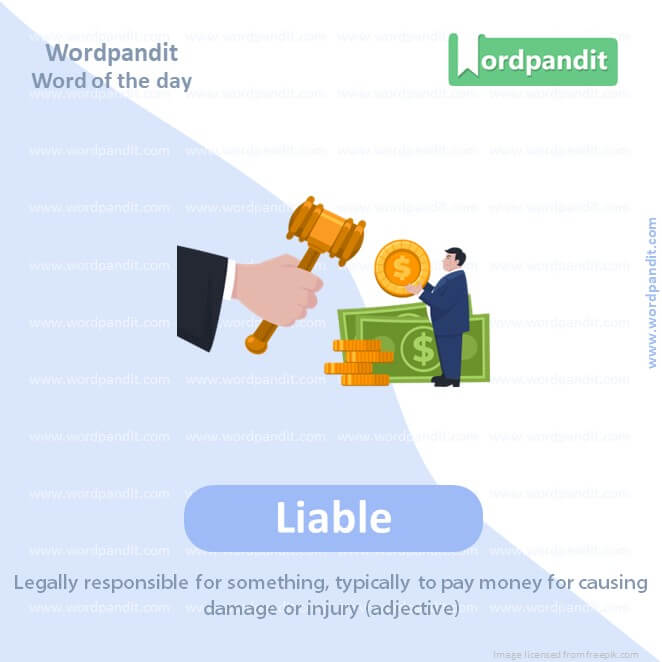
WORD-7: Liable
CONTEXT: This does not mean that Governors are not liable for their misbehaviour unconnected with their official duty.
SOURCE: The Hindu
EXPLANATORY PARAGRAPH: Imagine you’re playing with your toy cars and accidentally crash one into the other. Since you were the one who made it happen, you’re “liable” for the crash. It’s like being responsible for something because you caused it to happen.
MEANING: Legally responsible for something, typically to pay money for causing
damage or injury (adjective).
PRONUNCIATION: LY-uh-buhl
SYNONYMS: Responsible, accountable, answerable, subject, prone, susceptible, vulnerable
USAGE EXAMPLES:
1. The company is liable for damages caused by its faulty products.
2. If you leave your bike unlocked, you are liable for it being stolen.
3. Parents are liable for their children’s actions until they reach a certain age.
4. The driver was found liable for the accident due to reckless driving.
WORD-8: Whimsical
CONTEXT: In Rameshwar Prasad v. Union of India (2006), after finding that the Governor abused power in recommending Presidential rule in Bihar, the Supreme Court said that the motivated and whimsical conduct of the Governor is amenable to judicial review.
SOURCE: The Hindu
EXPLANATORY PARAGRAPH: Imagine you have a magical wand that can turn anything into a pumpkin. When you wave it around, turning trees and houses into pumpkins just for fun, you’re being “whimsical.” It’s like doing things in a playful and imaginative way, without following any strict rules.
MEANING: Playfully quaint or fanciful, especially in an appealing and amusing way (adjective).
PRONUNCIATION: WIM-si-kuhl
SYNONYMS: Playful, fanciful, quirky, capricious, eccentric, fanciful, offbeat, quirky
USAGE EXAMPLES:
1. She decorated her room in a whimsical style with colorful decorations.
2. The artist’s paintings were full of whimsical characters and scenes.
3. His whimsical sense of humor always brightened up the office.
4. The children’s book was filled with whimsical illustrations and magical adventures.
WORD-9: Amenable
CONTEXT: In Rameshwar Prasad v. Union of India (2006), after finding that the Governor abused power in recommending Presidential rule in Bihar, the Supreme Court said that the motivated and whimsical conduct of the Governor is amenable to judicial review.
SOURCE: The Hindu
EXPLANATORY PARAGRAPH: Imagine your friend suggests playing a game, and you happily agree to it. You’re being “amenable” by being easy to work with and open to ideas. It’s like being willing to go along with something without causing any problems.
MEANING: Willing to agree or accept something, often without protest (adjective).
PRONUNCIATION: uh-MEE-nuh-buhl
SYNONYMS: Agreeable, compliant, cooperative, accommodating, tractable, obliging, responsive
USAGE EXAMPLES:
1. She was amenable to trying new foods when traveling to different countries.
2. The employees were amenable to the new work schedule proposed by the manager.
3. He found her amenable to his suggestions for improving the project.
4. The committee members were amenable to making changes based on feedback.
WORD-10: Gestures
CONTEXT: Yet, the question of whether Governors can claim immunity for extra-constitutional gestures and utterances was not a matter in issue in Rameshwar Prasad.
SOURCE: The Hindu
EXPLANATORY PARAGRAPH: Imagine you want to tell your friend how much you like their drawing, but you’re speechless. Instead, you smile and give them a thumbs-up. These movements you make with your hands or face to express your feelings are called “gestures.” It’s like talking without using words.
MEANING: Movements of the body, especially hands and face, to express feelings or convey information (noun).
PRONUNCIATION: JES-churs
SYNONYMS: Signals, signs, motions, expressions, signals, indications, actions
USAGE EXAMPLES:
1. She made a gesture of gratitude by bowing deeply.
2. His gestures of affection towards his pets were heartwarming.
3. The politician’s gestures during the speech conveyed sincerity and passion.
4. In some cultures, certain gestures may have different meanings than in others.
Vocabulary Words
When delving into the dynamic world of languages, the grandeur of ‘vocabulary words’ is all-encompassing. The importance of ‘vocabulary words’ in effective communication cannot be overstated; it’s these words that form the backdrop of any language, painting intricate pictures of thoughts and ideas.
Starting on the journey of learning ‘vocabulary words’, one should steer clear from rote memorization. The traditional structure of merely repeating words lacks the necessary context and application that actually embeds these words into your memory. To truly master the ‘vocabulary words’, one needs an integrated, immersive approach.
The first step towards mastering ‘vocabulary words’ is to engage with varied language mediums. Expanding beyond textbooks to read fiction, articles, blogs, and other forms of content not only diversifies your vocabulary but also acts as a mirror to reflect the practical application of these words. Essentially, you’re exposed to the words as they are commonly used, allowing you to truly understand their essence.
Empowering this journey, tech tools like language learning apps and memory-enhancing flashcards significantly aid in learning ‘vocabulary words’. These interactive tools provide a more engaging learning experience and hone word retention. Mnemonic devices, associating words with a unique story or visual image, enrich the process and make memory recall more efficient.
Practicing ‘vocabulary words’ by using them in day-to-day conversations exemplifies learning by doing. It also strengthens the neural pathways and improves overall word recall. This, coupled with regular revisions, ensures your grasp over ‘vocabulary words’ remains strong.
In conclusion, learning ‘vocabulary words’ is not just about adding words to your linguistic cupboard, but understanding their essence and utilizing them effectively. An inclusive approach to learning that combines diverse reading materials, technology tools, mnemonic devices and practice can really propel your mastery over ‘vocabulary words’. Remember, language is the bloodline of communication, and ‘vocabulary words’ are its heartbeat. ‘











